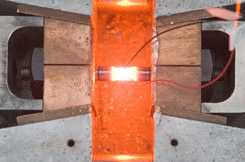 One of the Research Laboratories of Corus in UK, the international metals group formerly known as British Steel, has deployed an Intel-based solution to radically overhaul the fine tuning of its modelling capabilities for metal manufacturing processes and product developments. Corus has found that a Linux cluster, implemented by high performance and technical computing specialist Streamline Computing and based on Intel Xeon MP and Intel Itanium 2 processors, is at least 100 times more powerful than the previous proprietary RISC-based UNIX solution and can save the company over 20,000 per annum in maintenance costs.
One of the Research Laboratories of Corus in UK, the international metals group formerly known as British Steel, has deployed an Intel-based solution to radically overhaul the fine tuning of its modelling capabilities for metal manufacturing processes and product developments. Corus has found that a Linux cluster, implemented by high performance and technical computing specialist Streamline Computing and based on Intel Xeon MP and Intel Itanium 2 processors, is at least 100 times more powerful than the previous proprietary RISC-based UNIX solution and can save the company over 20,000 per annum in maintenance costs.
The high-powered mixed Intel Xeon and Itanium processors deliver the performance to effectively run the commercial Abaqus and Fluent suite of solid mechanics and computational fluid dynamics (CFD) software packages to accurately model steel manufacturing processes and downstream applications.
Corus engineers in the UK are focusing in developing and using finite element and CFD techniques to accurately model key primary manufacturing processes such as reheating, multipass hot rolling and finishing processes, which involves modelling transient heat transfer, structure-property predictions and straightening/levelling of steel long products. Other applications such as welding are also key to Corus strategy for local and through process modelling, in addition to other downstream manufacturing processes such as sheet metal forming and packaging, which are carried out in another Corus Research Laboratory in Holland. This is to ensure that processes and product properties can be optimised to meet more stringent specifications and customer demands.
Weve been immensely impressed with the Intel-based solution implemented by Streamline Computing, said Dr Didier Farrugia, Knowledge Group Leader in Product Modelling and Control, Long Product Rolling, at Corus. Using Abaqus, we estimate we can now complete a full 3D rolling analysis task in less than 20 minutes rather than a matter of hours and run complete design experiments due to the high-performance of the Intel Itanium and Xeon-based cluster solution. As a result, this greater computing power enhances user productivity through less time spent awaiting tasks to be completed, and metal production is improved and optimised due to the ability to run more complex calculations and optimisation at a significantly lower maintenance cost.
As demands of higher quality steel products to meet challenging engineering, automotive and construction markets increase, Corus stands to continue reaping the productivity, performance and cost benefits of the Intel Xeon and Intel Itanium 2 processor-based clusters in the metal fine tuning process, said Rick Skett, Country Manager, Intel UK & Ireland.
Were pleased to have worked closely with Streamline Computing to ensure that this solution exceeds the expectations of Corus engineers to improve the way they work.
In addition to improved computing performance, memory capabilities for the solution have also been significantly enhanced so Corus can now access up to 64 gigabites of memory on a single Itanium node to run more diverse, complex finite element analysis.

Add a Comment
No messages on this article yet